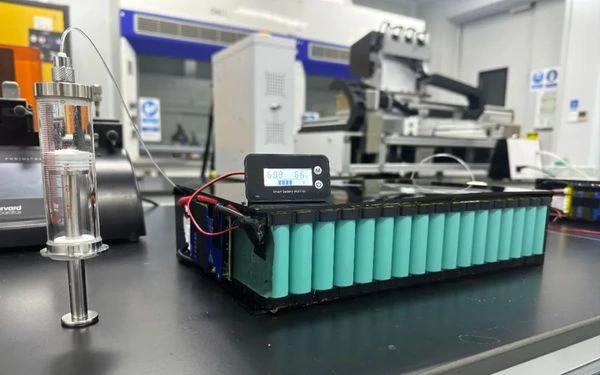According to China Daily, researchers at Fudan University, in collaboration with Nankai University, Hunan University of Engineering, and Shenzhen University, have developed a groundbreaking lithium-ion carrier molecule, CF3SO2Li, that significantly extends the lifespan of lithium-ion batteries (LIBs). This innovation, powered by artificial intelligence (AI) and cheminformatics, challenges conventional battery degradation principles and could transform EV battery sustainability, large-scale energy storage, and consumer electronics.
How the Technology Works: A Medical Approach to Battery Aging
The study, published in Nature, presents a novel approach to battery restoration. Typically, LIBs degrade due to the loss of active lithium ions, leading to performance decline. The researchers discovered that CF3SO2Li, an organic lithium carrier, acts like a precision “injection treatment,” replenishing lost lithium ions while preserving the cathode and anode structure.
Key aspects of this breakthrough include:
- AI-Optimized Molecular Design: The team digitized molecular structures and properties and used unsupervised machine learning to predict and optimize lithium carrier performance.
- Direct Lithium Replenishment: Unlike traditional methods that focus on cathode replacement, this approach selectively injects lithium ions, restoring electrochemical stability.
- Scalable and Cost-Effective: The carrier molecule costs less than 10% of the total battery, making it viable for large-scale adoption.
“The structure of this molecule is quite simple, with lithium electrons at one end and the rest of it acting like a vehicle that transports lithium electrons into the aging battery. The vehicle component is eventually discharged as gas.,” – Professor Gao Yue, Fudan University
Potential to Transform the Battery Industry
Early experiments demonstrate that CF3SO2Li can extend battery lifespans to between 12,000 and 60,000 cycles, a 12- to 60-fold improvement over existing LIBs used in EVs, which typically last 1,000-1,500 cycles. This enhancement is particularly significant for:
- Electric Vehicles (EVs): Extending battery longevity to 30+ years, reducing battery waste and costs.
- Renewable Energy Storage: Improving grid-scale storage efficiency and reducing reliance on rare metals.
- Consumer Electronics: Significantly reducing e-waste from smartphones, laptops, and tablets.
Scaling Up: Industry Commercialization
The research team has already conducted successful validation tests with a leading Chinese battery manufacturer, accelerating its path toward commercial implementation. Future applications include:
- Sustainable battery cycling: Reducing the environmental impact of LIB disposal.
- Next-generation battery chemistries: Exploring lithium-free materials for higher energy density and safety.
Future Outlook: A Circular Economy for Lithium-Ion Batteries
By combining AI-driven molecular discovery with direct lithium replenishment techniques, Fudan University’s research introduces a potential paradigm shift in battery lifecycle management. If widely adopted, this breakthrough could eliminate the need for frequent battery replacements, positioning lithium-ion batteries as a truly long-term energy solution. With ongoing industry collaboration, R&D investments, and scaling initiatives, this innovation is poised to redefine battery longevity, ensuring sustainability and efficiency for the global EV, consumer electronics, and energy storage industries.
Want to stay updated on the battery industry? Check out the latest news on BatteriesDaily!











